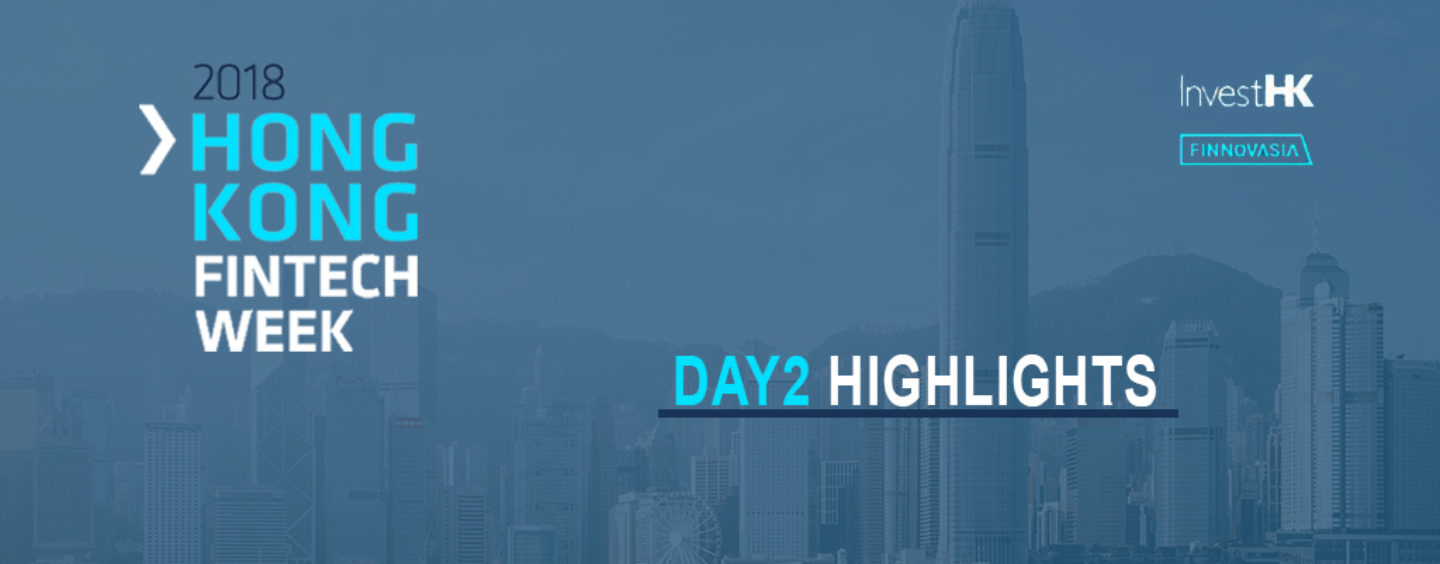Day two of the FinovateAsia leg of Hong Kong Fintech Week, organised by Invest Hong Kong (InvestHK), focused on the need for financial institutions to adapt to change or risk disappearing, along with fintech petting zoos, when to run and exciting developments in mainland China, before ending on a high with a launch event for the InvestHK part of Fintech Week at the Hong Kong Exchange.
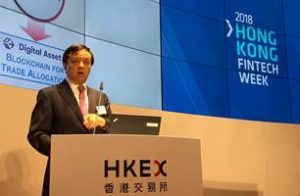
Charles Li
In fact, the HKEx event, an entrée to the regulator day on Wednesday, proved to be the highlight of the day. In a welcome speech, Charles Li, CEO of the HKEx, talked about the important role of the exchange in supporting business as the fintech start-ups drive the market forward, changing processes, with automation and robotics.
Mr. Li then announced that the HKEx will be working with Digital Asset to “introduce the first blockchain platform in the financial services industry in Hong Kong.” He said this will initially be for Stock Connect. “If it works with Stock Connect, there’s no reason why we can’t extend it to the broader market.”
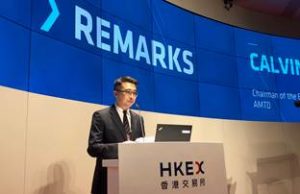
Calvin Choi
Calvin Choi, the Chairman and President of AMTD Group, spoke after Charles Li. He talked about the exciting three days ahead, while indicating strongly that the audience can expect to hear some significant fresh news relating to AMTD and mainland China.
Financial institutions must change
At the start of the day, in his keynote entitled “Why Financial Institutions Have to Change or Risk Being Burnt to the Ground,” JP Nicols, Managing Director of Fintech Forge, made the point that large as adjusting to the changing demands of their consumers, but that might not be enough.
Drawing on a famous bankruptcy, he said that “Blockbuster won by executing best in the industry [it operated in] until they didn’t. Netflix didn’t beat them at their game, it changed the game [and won at that].” For banks, in the future, executing well won’t be enough, they need to be able to genuinely adapt, he said.
Mr. Nicols also talked about the need to go beyond “innovation theatre.” He said:
“We need to get away from the ‘Fintech Petting Zoo’,” a reference to fintech events. “Going to a petting zoo doesn’t make you a farmer.” Likewise wearing a hoody and attending fintech events doesn’t make you an innovator, he said. “Innovation is implementing ideas that add value.”
He said the move fast and break things ethos of Silicon Valley doesn’t work in fintech. “Modern agile business methods have been around for a while, but haven’t taken much root in our industry,” said Mr. Nicols. “They need to be adapted for the highly regulated market we operate in.”
The audience was then introduced to a new acronym: FIRE – Fast, Iterative, Responsive and Experiment. Being a “fast follower is good, but you’ve got to be really fast, otherwise you miss the growth curve and fail,” said Mr. Nicols. He added that fast continuous improvement is driven by data. “Without data you just have opinions.” He then commented on the need to be responsive and to experiment or test things and learn along the way.
Empowering employees, improving customer experience
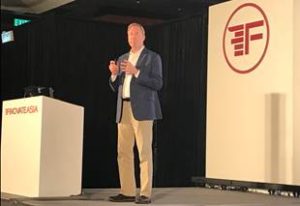
Daniel Latimore
Commenting on what’s hot and what’s not, Daniel Latimore, Senior Vice President of the Banking Group at Celent, while noting it’s been said before, reiterated the importance of banks focusing on customer experience. That doesn’t just mean differentiating product and philosophy, he said, it means improving things for employees to empower the front lines, rather like what you see fintech companies doing.
Mr. Latimore talked about security and biometrics, along with the importance of brand, particularly in relation to spin-off financial services and products, such as “Marcus” by Goldman Sachs.
Fintechs may have cutting edge, but they lack brand, customers, strong balance sheet and regulation. Partnering is important, he said, especially “partnering with established tech incumbents that can manage the due diligence and have an ecosystem of other providers.” Banks need to get better at partnering, he added.
Cryptos in the spotlight

Henri Arslanian
Henri Arslanian, Fintech & Crypto Lead, Asia, at PWC, in an energetic presentation, informed the audience: “Whenever someone tells you they are a crypto expert, you need to run away.” In a speech focusing on cryptocurrency trends, he also had a message for hackers: “If you’re a hacker not targeting crypto exchanges, you’re an idiot.”
Emerging trends in this area include the rise of crypto investment funds and the rise of asset-backed crypto assets – asset backed by real assets such as cash. He noted too the greater involvement of regulators, who need to be “really worried about the bad apples,” and the growth in industry best practices.
“We’re seeing an increase in regulatory enforcement cases – people will go to prison,” he said.
Stephen. Kade, co-Founder of TrustToken and TrueUSD in the U.S., highlighted the potential of blockchain.
“Blockchain gives a record of ownership that’s secure, global and 24/7. Digitialized assets bring value to those assets. It’s a $260-plus trillion market,” he said. “Digitized assets allow for far greater variations in scale from very small to large, all secure and tradable.”
Hong Kong’s strengths and China’s scale
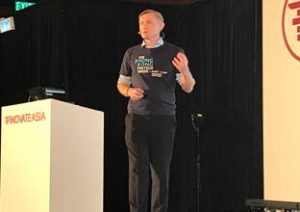
Charles d’Haussy
Charles d’Haussy, Head of Fintech at Invest Hong Kong, then shared with the audience how fintech companies and financial institutions around the world and across the border are leveraging Hong Kong’s unique strength as an entry point to the Greater Bay Area. He gave a snapshot of the Hong Kong fintech ecosystem, which now has more than 500 fintech companies.
The afternoon sessions focused on mainland China, lending and digital transformation, with guest speakers and panelists including Scott Bales, Managing Director of Innovations Labs Asia, who talked about mapping out your digital transformation plan. Tat Lee, General Manager (HK) from WeLab talked about how new players are harnessing new technologies to disrupt the digital lending landscape.
In a fireside chat, Tim Leung, Head of B2B Product Group at Tencent spoke about how new players can capture the huge opportunity presented by the financially underserved in China. Paul Schulte, Chairman of Schulte Research, returned to FinovateAsia for the second time to give another compelling briefing on why China is the most progressive fintech market in the world.
The digital transformation and customer experience discussion drew on the expertise of C-suite officers from HSBC, Summit Bank, Asia Commercial Bank and Manulife.
Finovate Asia 2018 wrapped up with the Finovate Finale where the winners of the start-up pitching contest were announced. Avaloq, Arival Bank and voca.ai were the three winners. Avaloq is shaping the future of open banking by building trusted customer-centric banking solutions with great user experience, while Arival Bank is the first digital fintech bank for a new generation of businesses, and voca.ai supplies intelligent call centre agents for banking and insurance.
You can check Hong Kong Fintech Week 2018 – Day 1 Highlights here
Featured image credit: Edited from Unsplash




